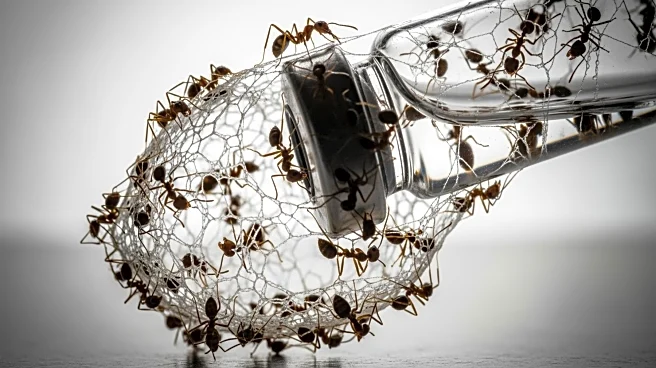What's Happening?
A study has investigated the effects of the insecticide flupyradifurone on the ant species Lasius niger, revealing a synergistic interaction with the fungal pathogen Metarhizium brunneum. The research involved exposing ants to sublethal concentrations
of flupyradifurone and subsequently challenging them with the fungus. The results showed that the combination of the insecticide and the pathogen led to increased mortality compared to either stressor alone. The study highlights the potential for interactions between chemical and biological stressors to impact insect populations, with implications for pest management and ecological research.
Why It's Important?
The findings of the study have significant implications for pest management strategies, as they suggest that the combination of chemical insecticides and biological pathogens can enhance mortality rates in target insect populations. This synergistic effect could be leveraged to improve the effectiveness of pest control measures, potentially reducing the need for higher concentrations of insecticides and minimizing environmental impact. The research also contributes to the understanding of how multiple stressors interact in ecological systems, providing insights into the complex dynamics that influence insect populations and their responses to environmental changes.
What's Next?
Further research may explore the mechanisms underlying the synergistic interaction between flupyradifurone and Metarhizium brunneum, with the aim of optimizing pest management strategies that utilize both chemical and biological control methods. The study's findings could inform the development of integrated pest management approaches that balance efficacy with environmental sustainability. Additionally, researchers may investigate the broader ecological implications of such interactions, considering how they affect non-target species and ecosystem health. The potential for similar interactions in other insect species and environments may also be explored.
Beyond the Headlines
The study raises ethical considerations regarding the use of chemical insecticides and their impact on ecosystems. It highlights the need for responsible pest management practices that consider the potential consequences of chemical and biological interactions on non-target species and ecological balance. The research also underscores the importance of interdisciplinary approaches in addressing complex environmental challenges, integrating insights from entomology, ecology, and chemistry to develop sustainable solutions. As pest management strategies evolve, the role of scientific research in guiding policy and practice becomes increasingly critical.














